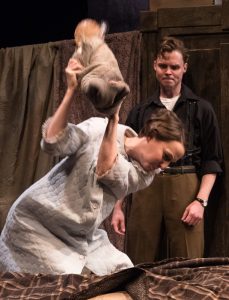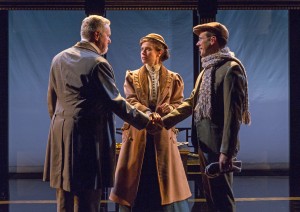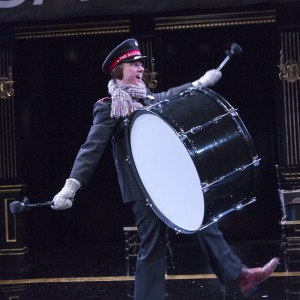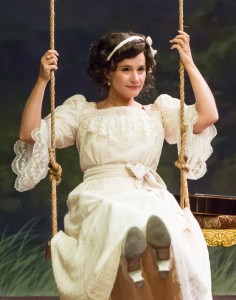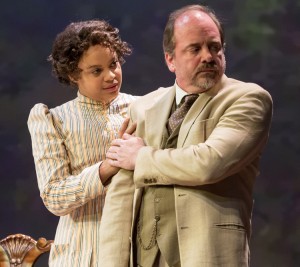“This is not a moral place,” proclaims a master of ceremonies at the outset of the Pearl Theatre Company’s energetic Vanity Fair. “Nor is it often a merry one,” he adds, “for all of its pageantry and noise.”
Young But Wise
Shelagh Delaney was only 18 when her first play, A Taste of Honey, premiered in London in 1958 and she added to the gender diversity of the Angry Young Men of postwar British theater. The play was developed at the acclaimed producer Joan Littlewood’s Theatre Workshop, and it contains some of Littlewood’s hallmarks, notably a jazz trio playing standards that evokes the British music hall (a popular influence in British theater, used by John Osborne as the setting for The Entertainer and by Littlewood herself in Oh, What a Lovely War!—and on through Privates on Parade, right up to One Man, Two Guv’nors in 2011).
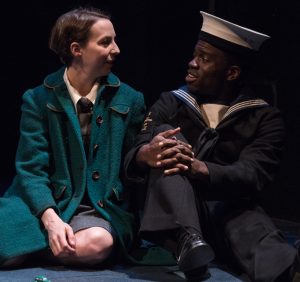
As with Osborne, Arnold Wesker, and John Arden, the focus of the “angry theater” was the travails of the working-class English. Delaney’s play is set in Manchester, and concerns Jo, who is 17 and lives with her mother, Helen (Rachel Botchan), a sometime prostitute. For the late 1950s, and for an author of 18, A Taste of Honey is astonishingly frank and casual about taboo topics of the period. Jo refers diffidently to Helen’s “immoral earnings.” Jo herself has an affair with a black sailor (Ade Otukoya) and becomes pregnant by him. She sets up house with a fellow art student, Geoffrey (John Evans Reese), who is gay and has more nurturing instincts toward her than Helen does.
Jo’s fractious relationship with her mother is, in Delaney’s play, the fault of both characters. Rebekah Brockman’s Jo is irritatingly immature and impractical, yet self-confident, and she and Helen squabble frequently. Helen has clearly not taken a strong hand in raising her daughter, and Jo is a free spirit as a result, mouthing off in a way that the vast majority of middle-class 1950s teenagers probably wouldn’t dare to.
Meanwhile, the narcissistic Helen blows hot and cold about caring for her daughter. “Why don’t you learn from my mistakes?” she asks Jo solicitously at one point. “It takes half a life to learn from your own.” Yet she’s also capable of saying, “I never have thought about you when I’ve been happy.” It’s a measure of Delaney’s maturity that she can create characters so complex and show the struggles of their lives so vividly.
The play focuses on Jo’s coming of age. Helen has a roistering time with a former client/boyfriend named Smith (Bradford Cover, with an eyepatch), who has tracked her to their new digs. Joe resents Smith and spars with him verbally, even though he makes overtures to be kind to her. (In The Angry Theatre, John Russell Taylor, who saw Delaney’s original script, says Smith’s kindness was toned down in Littlewood’s final version.) Eventually Helen runs off with him, only returning after Smith has run off with a younger woman. Meanwhile, Jo and Geoff have established a home of a sort—Jo works in a shoe shop by day and a bar at night. But Botchan’s selfish, blundering Helen, now displaced, ousts Evans’s gentle, patient Geoff in the awkward, melancholy climax.
The play is a dream play, with flights of fancy and high theatricality in spite of its working-class milieu—Jo talks about the sailor being “an African prince,” and Geoffrey yearns to be a father figure in a heterosexual family and fit in. Characters deliver asides to the audience in the manner of Restoration comedy. Director Austin Pendleton uses the jazz trio not only to punctuate verses of songs that the characters break into, and to cover scene changes, but also as a silent chorus. When Helen shows them racy advertisements, Max Boiko (trumpet), Walter Stinson (bass), and Phil Faconti (guitar) play along and take a look with wry reactions; two of them often share the sofa with the speaking characters. (Harry Feiner’s scenic design delivers a heavier dose of realism, with its drab browns, duns and mustards, visually enlivened only by Barbara A. Bell’s bright dresses for Helen.)
Still, there’s a sense that, even with its open artifice, Delaney’s characters were lifted out of a vacuum and placed in this setting. As a dream play, it’s not as easy to adjust to or as persuasive as, say, The Glass Menagerie. Delaney never had a bigger success than A Taste of Honey, and it’s rarely revived nowadays. It has perhaps frayed a bit at the edges, but it’s still a work that continually surprises with its modern feel. The Pearl Theatre’s season opener is a welcome opportunity to see it.
The Pearl Theatre's production of A Taste of Honey will play through Oct. 30 at 555 W. 42nd St. Performances are at 7 p.m. on Sept. 20, 22, Oct. 3, 4, 10, 12, 13, 16, 20 and 24; at 8 p.m. Sept. 23, 24, Oct. 21, 22, and 29; and at 2 p.m. Oct. 2, 22, 23, and 30. Tickets are $59 and may be purchased by calling the theater at (212) 563-9261 or visiting pearltheatre.org.
Shakespeare With Tears
You’re not ever likely to see a staging of A Midsummer Night’s Dream similar to that at the Pearl Theatre Company, a co-production with the Hudson Valley Shakespeare Festival. That’s almost certainly a blessing. Directed by Eric Tucker of Bedlam, a company known for its pared-down renderings of classics—including a powerful Saint Joan and Hamlet—A Midsummer Night’s Dream currently on the boards is a misbegotten mess. Somewhere underneath the countless irrelevancies encrusting this version may be a play about lovers, poets and fools, but despair at finding it sets in quickly.
Bedlam uses no props, so there’s a lot of miming of them; some you won’t expect. Early on, Hermia is tied up and her arms winched into the air as if she’s about to be interrogated by black-ops agents rather than Theseus. Anyone who has ever seen a traditional version of A Midsummer Night’s Dream may wonder what is going on—as will anyone who hasn’t. The five actors are not only responsible for imagining their props, but they take on multiple roles and produce their own sound effects. In fact, there is so much accumulated shouting and stage business that the story barely comes through, let alone the poetry.
Tucker has introduced action to accompany virtually every line. When Egeus complains that Lysander “bewitched the bosom of my child,” Lysander air-squeezes Hermia’s imagined breasts. When Jason O’Connell’s Bottom speaks of “a tyrant,” his hands become pistols and he shoots them. O bad tyrant! Looking for his comrades, Bottom says, “Where are these hearts?” That leads O’Connell to pull an imaginary one from his chest and gnaw it like Hannibal Lecter. Everything must be illustrated, no matter how inappropriately, in this Shakespeare for Imbeciles production.
It’s not enough to pile on irrelevancies: Tucker has vulgarized the play as well. When Mark Bedard’s Oberon says, “I do but beg a little changeling boy to be my…henchman,” the pause he inserts suggests latent pedophilia. When the actors cluster together late in the play (as they often do to become scenery, though not in this case), there’s suddenly an orgiastic scene of hip-thrusting intercourse and tongue work. When Puck returns to Oberon with the flower love-in-idleness, he doesn’t have it in hand. Oh, no, it’s down his throat so he can hawk loudly and puke it out!
Amid this goulash, Nance Williamson shows the best command of poetry, both as the brusque Hippolyta and lumbering Helena. Bedard recites the verse clearly enough, but doesn't quite find the music in it. O’Connell is egregiously irritating as Puck, Bottom, and Pyramus. As the last, he yells for Thisbe in the style of Marlon Brando as Stanley Kowalski in A Streetcar Named Desire. (He also does an impression of Al Pacino in Bottom’s “shivering shocks” speech, and they’re amusing, but unnecessary.)
The performers may be excused, given all that Tucker has taxed them with. They contribute constant sound effects and movement: weird noises, rolling around, wrestling, humming the music from Jeopardy and “The Girl from Ipanema,” grunts, clasping one another, shrieks, falling to the ground in an instant, tsk-tsks and putting on silly accents (Sean McNall’s Demetrius seems to be Spanish by way of Scotland; Bedard’s Thisbe has a Southern twang). Scarcely a sentence goes by without some enhancement. Oberon’s speech “The next thing then she waking looks upon/Be it on lion, bear, or wolf, or bull/On meddling monkey, or on busy ape/She shall pursue it with the soul of love” cues an aural zoo as the actors contribute the sounds of each animal mentioned. But nothing is so impressive as the rare moments when the words are left to be heard on their own—Bedard’s Oberon, speaking of a “boar with bristled hair,” or Helena’s late soliloquy. It’s then one realizes what quality the actors might be capable of.
Heaped with praise by critics at the The New York Times and The Wall Street Journal, this production of A Midsummer Night’s Dream was clearly not to the taste of a scowling woman speaking to a friend at intermission. Passing by, I overheard only the word “indefensible.” Whether it applied to those reviews or to the production itself, she was on the money.
A Midsummer Night's Dream plays through Oct. 31 at the Pearl Theatre (555 West 42nd St. between 10th and 11th Aves.) in Manhattan. Evening performances are at 7 p.m. on Oct. 7, 11, 12, 15, 20, 28 and 29 and at 8 p.m. on Oct. 9, 16, 17, 23 and 30. Matinees are at 2 p.m. on Oct. 8, 10, 14, 17, 18, 21 and 31. For tickets, call 212- 563-9261 or visit PearlTheatre.org.
Blessed Assurance (or Lack Thereof)
George Bernard Shaw's Major Barbara challenges Percy Bysshe Shelley’s assertion that poets are the "unacknowledged legislators of the world." So long as governments co-exist uneasily and individuals are unable to live in harmony with those sharing the planet, suggests Shaw in his 1905 play, munitions-makers will rule the global roost.
Major Barbara, currently revived at The Pearl Theatre Company, didn't arrive on Broadway until 1915, by which time World War I was well underway in Europe. The play begins as high comedy, shifts disconcertingly to naturalism in Act Two, and concludes with a fantastical debate in which the title character (Hannah Cabell), a Salvation Army officer, and her fiancé, Adolphus Cusins (Richard Gallagher), undergo changes of heart that strain credibility to a greater extent than usual in Shaw's work. Despite its structural flaws, Major Barbara is a perpetual crowd-pleaser; this comedy-drama and its heroine may be second only to Pygmalion and its principals, Liza and Professor Higgins, as Shaw's audience favorites.
When the last prominent New York revival of Major Barbara opened (with Cherry Jones in the lead), the towers of the original World Trade Center still drew the eye to lower Manhattan; and Americans were enjoying the benefits of an extended era of peaceful (or relatively peaceful) relations abroad. Six days before the play’s scheduled closing, the Trade Center was attacked by air and both towers were destroyed. That tragedy moved the U.S. President to declare a Global War on Terror and to sign, two days after the play's closing, the Authorization for Use of Military Force. The years since have been marked by American combat in Afghanistan, Iraq, and elsewhere, as well as fluctuating economic conditions, with an ever-widening gap between rich and poor. Shaw's concerns about poverty, privilege, war, and religion seem more urgent now than they did in the summer of 2001.
As always at the Pearl, an array of accomplished actors is on view. Dan Daily gives the evening’s most notable performance as Barbara's father, the fiendishly clever Andrew Undershaft, an armaments kingpin who believes poverty to be the world's most heinous crime. Undershaft riffs on the Republic: “Plato says … that society cannot be saved until either the Professors of Greek take to making gunpowder, or else the makers of gunpowder become Professors of Greek.” Daily is well-matched by Gallagher as the geeky Greek tutor who, against all odds, becomes Undershaft's heir both in the family and on the world's political stage.
Major Barbara is directed by David Staller, founding artistic director of the Gingold Theatrical Group which is co-producing with the Pearl. The stylish production is designed by James Noone (scenery), Tracy Christensen (costumes), Michael Gottlieb (lighting), and M. Florian Staab (sound). Six of the nine actors handle two roles (or, in one case, three), moving effectively up and down the social ladder. In a program note, Staller explains this doubling as inspired by a remark of Shaw’s that, “but for an accident of birth,” characters such as the aristocratic Lady Britomart and the middle-middle-class Mrs. Baines, the Salvation Army Commissioner (both played by Carol Schultz), or the prim, high-born Stephen Undershaft and the unemployed lout Snobby Price (played by Alec Shaw), “might have become one or the other.” Christensen’s resourceful costume designs aid the actors in shifting swiftly from one social stratum to another in plain view of the audience. It’s a dash of Brecht in an evening of Shaw.
The great Irish dramatist named his play for Barbara but, as he revised it, her father emerged as the most forceful of the dramatis personae. In the wrong hands, Undershaft can overwhelm the other characters (especially in the last scenes). Daily tempers his performance, a model of actorly restraint, so as to recalibrate the lopsided exuberance of Shaw's text and ensure balance among Undershaft, Adolphus, and Barbara in their memorable but tricky last-act trio.
Shaw called the conclusion of Major Barbara “terrible” and lamented that, despite a quarter century of post-premiere tinkering, he couldn't eliminate the flaws. In the 2001 revival, the principal actors made the final scene convincing with the emotional force of their performances. Under Staller's supervision, the Pearl's cast does justice to the wit of Major Barbara but seldom conveys the raw feeling that ought to animate the brainy talk. Without that, there's no accepting the conviction of Barbara and Adolphus that they can save the world by forsaking charity and classical learning for the armaments industry.
Major Barbara is playing through December 14 at the Pearl Theatre Co. (555 West 42nd St.). Performances are Tuesday at 7 p.m.; Wednesday, Saturday, and Sunday at 2 p.m.; and Thursday–Saturday at 8 p.m. Tickets are $65 for regular admission; $39 for seniors; and $20 for students and rush Thursday. For tickets, please visit pearltheatre.org or by call 212-563-9261.
Vanya @ 11th Avenue
The Pearl Theatre Company, which occupies a fine modern facility on West 42nd Street near 11th Avenue, has selected Anton Chekhov's Uncle Vanya, in a translation by the late Paul Schmidt, to open its 2014–15 season. Subtitled “Scenes from Country Life,” this comedy—or, rather, this special, melancholy kind of comedy—is one of four major plays the dramatist wrote near the end of his relatively short life.
The characters of Uncle Vanya are recognizable in their frustration and disappointment; their bickering and folly are readily believable. Though short on plot, the text is rich in dialogue and subtext. It's a beloved and influential play, constantly revived all over the world. Recent American works such as Vanya and Sonia and Masha and Spike by Christopher Durang (the most produced script in professional theaters around the U.S. this season, according to American Theater magazine) and The Country House by Donald Margulies (newly opened at Broadway's Friedman Theatre) owe it a conspicuous debt. When Uncle Vanya returns to New York, attention must be paid.
The play takes place on a country estate run by Sonya (Michelle Beck) and her maternal uncle (Chris Mixon), the title character. Sonya's father, Alexander Serebriakov (Dominic Cuskern), is a vainglorious scholar whose career and vitality are winding down. Serebriakov's luxurious city existence has been financed by the hard work and frugal living of Sonya and Vanya on the farm. Arriving in the country for an open-ended stay, the professor and his much younger wife, Yelena (Rachel Botchan), interrupt the rhythms of country life. Their selfish, inconsiderate ways exacerbate resentments that have festered in the family for years; and Yelena's flirtatious allure leads to intrigue (or attempts at intrigue) and emotional havoc among males in the vicinity, especially Vanya and a family friend, Dr. Astrov (Bradford Cover).
The Pearl's production, directed by company artistic director Hal Brooks, is exquisite to behold. With movable pillars and fast traveling curtains, scenic designer Jason Simms transports the action efficiently from one room to another. A backdrop in soft colors, revealed when actors sweep the upstage curtains aside, brings the Russian countryside on stage; and Seth Reiser's expertly modulated lighting lends a sense of time passing from day to night and back to day at a languid pace appropriate to Chekhov.
This Uncle Vanya has no shortage of capable actors. Robin Leslie Brown brings intelligence and a light touch to the role of Marina, the old nurse who soothes shattered nerves and offers a long view of life. Cover's interpretation of Dr. Astrov is complex and arresting; his speech about reforestation is appropriate to the play's 19th-century setting yet sounds like something that might have been delivered at United Nations Climate Summit 2014 last month.
Mixon makes Vanya's disillusion palpable in the first two acts; but he plays the late scenes in a manic fashion that's anathema to Chekhov’s subtle brand of comedy and, at times, reminiscent of 1970s television sitcom. Other promising performances—Beck, Brad Heberlee as a neighbor nicknamed Waffles, and Carol Schultz as the foolish mother of the professor’s deceased first wife—suffer from direction that squeezes a sort of hilarity out of the script rather than trusting the playwright’s rueful humor. Botchan strikes the appropriate balance of insouciance and formidable stage presence for her role; but this Yelena seems to have wandered onto the Pearl stage from a play of later vintage than Uncle Vanya and from a different country than the other characters.
For a number of years, the Pearl has been one of the few companies in New York City consistently performing the so-called classical repertory of Western drama. The troupe’s tagline is “defining classics for New York,” and its work, whether up or down, is worth following. Uncle Vanya doesn't represent the Pearl anywhere near the top of its form; but next month the company, in tandem with the Gingold Theatrical Group, will present George Bernard Shaw's Major Barbara, directed by David Staller. If Major Barbara has the style, pace, and Shavian spirit of last season's You Never Can Tell, audiences will undoubtedly forget the shortcomings of Uncle Vanya and may even line up to renew their Pearl subscriptions early.
Uncle Vanya is playing through Oct. 12 at the Pearl Theatre Co. (555 West 42nd St.). Running time 2 hours, 20 minutes with intermission. Performances are Tuesday at 7 p.m.; Wednesday, Saturday and Sunday at 2 p.m.; and Thursday–Saturday at 8 p.m. Tickets are $65, senior $39, student rush $20, Thursday rush $20, and may be purchased at pearltheatre.org or by calling 212-563-9261.








